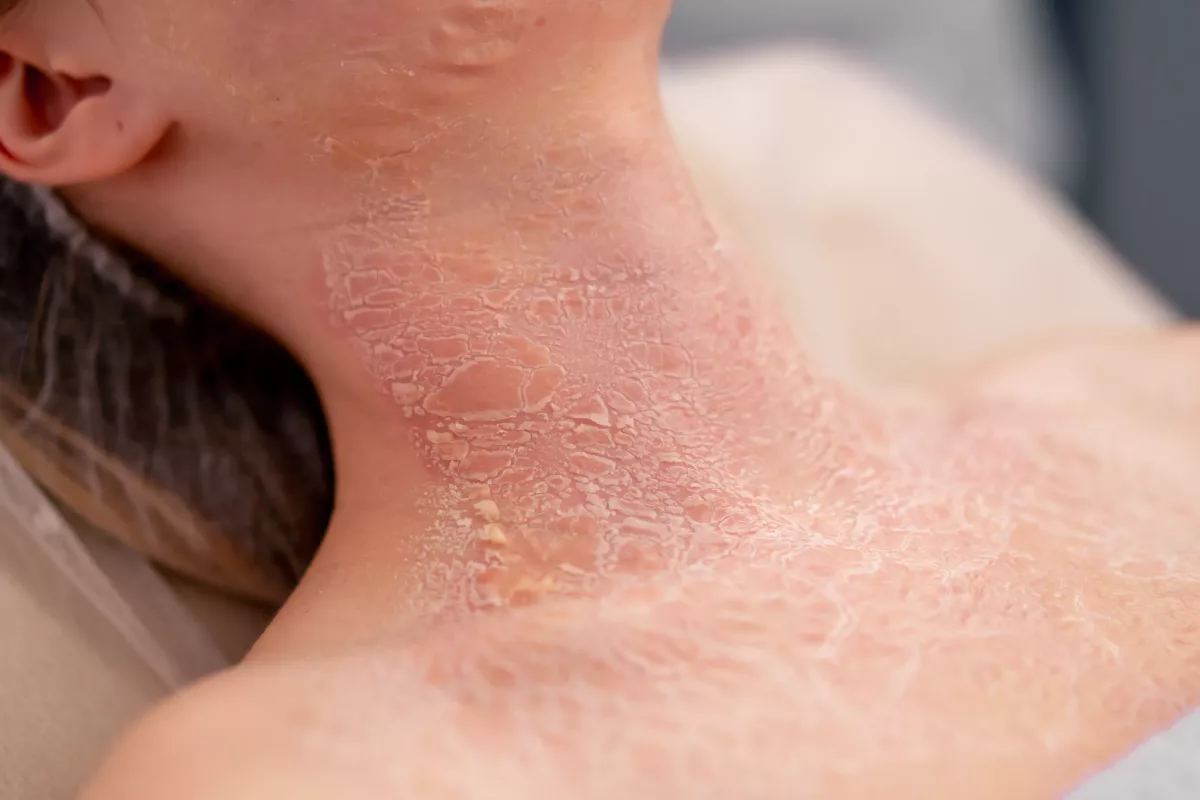A complication of eczema (also called dermatitis) that causes fluid-filled blisters on the skin is called weeping eczema. Usually, this condition occurs due to inflammation and may worsen the symptoms of eczema. Treatment usually involves corticosteroids, antihistamines, and immunosuppressive medicines.
Sometimes, weeping eczema is mistaken for impetigo. While both are skin conditions, weeping eczema is a complication of dermatitis, and impetigo is a skin infection. People with impetigo may also develop blisters and sores on the nose and mouth. However, weeping eczema may appear anywhere on the body and cause red or purple blisters that ooze clear-to straw-colored fluid. When it happens, people require treatment.
This complication of eczema happens quite commonly. Moreover, about 31 million people in the U.S. have some type of dermatitis. For example, atopic dermatitis, contact dermatitis, or seborrheic dermatitis. All types of eczema may cause weeping eczema, but the severity of the symptoms varies among people.
How Does Weeping Eczema Affect My Body?
When a person develops this eczema complication, it causes fluid-filled blisters on the skin that ooze and leave a yellow-to-orange crusty layer on the skin. The most affected parts of the body include the knees, inside the elbows, and in front of the neck, but it may also appear anywhere on the body. These include hands, face, lips, arms, legs, or feet.
Symptoms
Usually, people with weeping eczema experience the following symptoms. For example:
- Crusting and redness
- Itching, soreness, or burning of the skin
- Drainage of the skin
- Blisters or open sores
This complication may also worsen existing dermatitis symptoms (such as itchy skin). In severe cases, you may also experience the following symptoms. Examples include:
- Extreme tiredness (fatigue)
- Chills
- Fever
- Achiness
- Swollen lymph nodes, usually in the neck, groin, or armpit
Causes
This complication often occurs as a result of active inflammation in the skin. This inflammation is a result of the dilation of blood vessels in the skin that leak serum into the soft tissue. Therefore, it causes mild edema (swelling) and oozing of the serum on the surface of the skin.
It is important to know that you may get a skin infection if your skin becomes too dry, cracked, or inflamed. In most cases, people become infected with a common bacterium called Staphylococcus or herpes simplex virus (HSV-1) along with weeping eczema. Moreover, HSV-1 can also cause cold sores.
Generally, weeping eczema and dermatitis are not contagious, but a secondary infection linked with weeping eczema can spread from one person to another.
Can I Prevent Weeping Eczema?
While eczema cannot be prevented, you can prevent its complications. Usually, doctors recommend routine skincare management that includes the following recommendations. For example:
- Use an emollient-rich cream to keep the skin moisturized
- Administer antihistamine medicines to prevent itching
- Use steroid creams to lessen inflammation (do not take any steroid cream without a doctor’s recommendation)
- Supplements (including vitamin D, vitamin B12, and others)
- You should choose cleansers and shampoos without perfumes and additional dyes
- Manage stress (you can consider meditation or mindfulness)
Diagnosis
Physicians usually diagnose this dermatitis complication during a physical examination. They may also ask some questions about the symptoms. In any case, to confirm this condition, doctors will perform some tests. For example:
- Blood tests
- Allergy skin tests
- Skin biopsy
- Bacterial culture
Previous tests can also exclude other skin conditions that cause similar symptoms.
Treatment
Doctors usually recommend different treatments for people who develop weeping eczema. It depends on the exact cause of the condition, the severity of the symptoms, overall health, and your age and preferences. Check some treatments below:
- Corticosteroids – This is a group of medicines that help lessen inflammation and itching. Sometimes, physicians may prescribe oral steroids (such as Prednisone).
- Antihistamines – These medicines are frequently used in people with allergies. It helps reduce itchiness in people with dermatitis.
- Immunosuppressants – These medications are also used to relieve inflammation by suppressing the immune system response.
If you develop other skin conditions or infections, you may need additional treatments (such as antibiotics to treat bacterial infections).
Home Remedies
The following things may help relieve dermatitis symptoms at home. For example:
- Probiotics – Some studies suggest that probiotics may reduce the severity of the symptoms caused by weeping eczema.
- Natural oils – These include olive oil, coconut oil, and sunflower seed oil. These oils can speed up the healing of the skin and protect it.
- Supplements and vitamins – It is known that vitamin D and vitamin B12 help improve the most common symptoms of eczema (such as itching). Furthermore, fatty acids (such as black currant seed and evening primrose) may help lessen inflammation caused by this skin disease.
- Colloidal oatmeal bath – It helps relieve dry and itchy skin.
- Diluted bleach bath – You can add a small amount of bleach to the bathwater because it helps destroy bacteria on the skin. As a result, it may reduce redness, itching, and scaling caused by eczema. In any case, you should not take frequent bleach baths because they may cause damage to the skin. However, before taking such baths, you should discuss it with your healthcare professional.
Frequently Asked Questions
When should I see my healthcare provider?
If you think your eczema begins to weep, immediately contact your healthcare professional. Early diagnosis and treatment can prevent severe symptoms and keep the infection under control.
What cream is best for weeping eczema?
One of the most effective topical medicines for people who develop weeping eczema is topical Hydrocortisone. It helps reduce itching, irritation, and inflammation. However, this medicine comes in different forms, including ointments, creams, gels, and lotions.
Is the sun good for eczema?
Some people may notice improvements in the eczema symptoms with moderate sun exposure. These include decreased inflammation, improved vitamin D levels, and others. However, it is important to protect the skin from overexposure. Otherwise, it may lead to some unpleasant results, such as photosensitivity. Ask your healthcare provider if you have additional questions.




